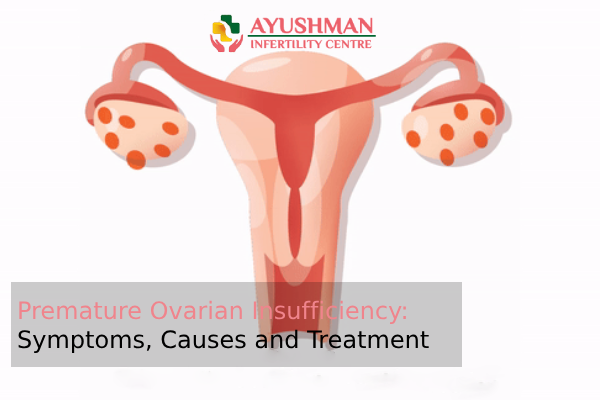
Premature Ovarian Insufficiency: Symptoms, Causes and Treatment
Overview
Primary ovarian insufficiency (POI) occurs when the ovaries cease to work correctly before the age of 40. This means the ovaries produce reduced levels of estrogen and fail to release eggs consistently, which frequently results in infertility. POI is also referred to as premature ovarian insufficiency and was once known as premature ovarian failure, but this older term is no longer used.
It’s important to note that POI is different from premature menopause. While both conditions involve the ovaries, those with POI may still have irregular periods and could potentially become pregnant. In contrast, premature menopause means periods have completely stopped and pregnancy is no longer possible.
For those with POI, treatment can help balance estrogen levels, which is crucial for preventing related health issues like heart disease and brittle bones.
Symptoms
The symptoms of primary ovarian insufficiency (POI) are often similar to those experienced during menopause or due to low estrogen levels. These symptoms may include:
Irregular or skipped periods, which can persist for years or start after pregnancy or stopping birth control.
- Difficulty conceiving.
- Hot flashes and night sweats.
- Dryness in the vaginal area.
- Feelings of anger, depression, or anxiety.
- Problems with concentration or memory.
- It reduced sexual drive.
When to see a doctor
If your period has been absent for three months or longer, it’s important to consult with your doctor to determine the cause. Many factors can disrupt your cycle, including pregnancy, stress, or changes in diet or exercise. Regardless of how you feel about the missed periods, a medical checkup is essential to identify any underlying issues.
Even if you’re not concerned about missing periods, a healthcare professional can help pinpoint the reason for the change. Low estrogen levels can contribute to conditions like osteoporosis, which weakens bones, and increases the risk of heart disease.
Causes
Primary ovarian insufficiency can be triggered by:
Chromosome Abnormalities: Chromosomes are thread-like structures in our cells that carry genes. Typically, those assigned female at birth have two X chromosomes. In some cases, people with primary ovarian insufficiency have one normal X chromosome and one altered X chromosome, which may indicate genetic conditions like mosaic Turner syndrome. Others may have fragile X syndrome, where the X chromosomes are prone to breaking.
Toxins: Treatments such as chemotherapy and radiation therapy can harm ovarian function by damaging the genetic material in cells. Exposure to toxins like cigarette smoke, certain chemicals, pesticides, and viruses can also accelerate the onset of ovarian insufficiency.
Autoimmune Reactions: In rare cases, the immune system mistakenly targets ovarian tissue, leading to what is known as an autoimmune disease. This can damage the ovarian follicles, which are responsible for storing eggs. The exact cause of this immune response has yet to be well understood, though viral exposure might play a role.
Unknown Factors: Often, the exact cause of primary ovarian insufficiency remains unclear, which is referred to as an idiopathic cause. Your doctor might suggest further testing to uncover any underlying issues.
Risk factors
Factors that increase the risk of primary ovarian insufficiency include:
- Age: The risk of developing primary ovarian insufficiency increases between the ages of 35 and 40, though it’s uncommon before age 30. However, it can occur in younger individuals, including teenagers.
- Family History: If primary ovarian insufficiency runs in your family, your risk of developing the condition is higher.
- Ovarian Surgery: Undergoing surgery that affects the ovaries can elevate the risk of experiencing primary ovarian insufficiency.
Complications
Primary ovarian insufficiency can lead to several other health concerns, such as:
- Infertility: Difficulty getting pregnant can be a major issue, although it’s sometimes possible to conceive before the body’s egg supply is depleted.
- Osteoporosis: This condition results in weakened, brittle bones that are more prone to fractures. Low estrogen levels, which are common with primary ovarian insufficiency, contribute to the risk of developing osteoporosis since estrogen is crucial for maintaining bone strength.
- Depression or Anxiety: The emotional impact of dealing with infertility and other complications related to low estrogen can lead to feelings of depression or anxiety.
- Heart and Blood Vessel Disease: A reduction in estrogen at a young age may increase the risk of cardiovascular issues, including heart disease and stroke.
- Dementia: This term describes a range of symptoms that affect memory, mental processing, and social skills. Risks for dementia may rise if both ovaries are removed and estrogen therapy is not provided, especially in those under 43.
- Parkinson’s Disease: This long-term neurological disorder impacts the nervous system and can be linked to an increased risk if ovarian removal surgery is performed.
Managing primary ovarian insufficiency with appropriate treatment can help reduce the risk of these related health issues.

Leave a reply